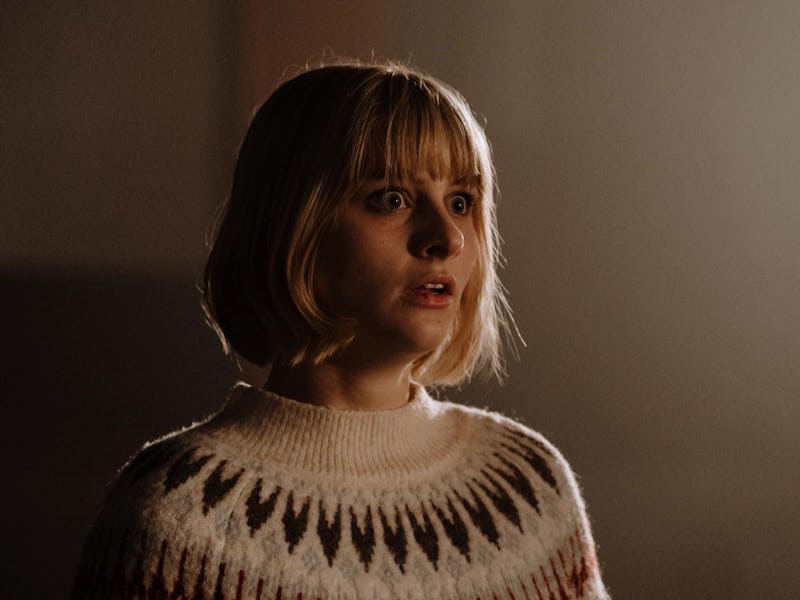It’s a Wonderful Knife is a Holiday Horror Misfire
The new slasher comedy takes several big swings, but it never quite hits the mark.

It’s a Wonderful Knife makes an all-too-common mistake: It wants to be way too many things all at once. Throughout its succinct 90-minute runtime, the new horror comedy tries to pay homage to not only the 1946 drama that its title riffs on, but also meta-slasher classics like Scream. It wants to bring a refreshingly queer perspective to the Christmas horror subgenre, while also packing in several cartoonishly over-the-top performances and just as many underbaked ideas about corporate greed and small-town gentrification.
The Tyler MacIntyre-directed film is the latest in a growing line of cheeky, horror-centric twists on famous movie plots. Unlike Freaky, Happy Death Day, and even last month’s Totally Killer, though, It’s a Wonderful Knife proves unable to pick a single tone and stick to it. The new movie, which could have been a perfectly fun holiday horror romp in less saccharine hands, wants desperately to be everything. As a result, it ends up feeling a whole lot more like nothing.
Set in the small, seemingly idyllic town of Angel Falls, It’s a Wonderful Knife follows Winnie Carruthers (Jane Widdop), a young high school student whose dreams of leaving her hometown behind are dashed when she and her friends’ Christmas Eve party is crashed by a masked slasher known only as “The Angel.” While Winnie manages to save her and her town’s holiday season from a seemingly unstopped reign of terror, it isn’t long before she begins to wonder whether everyone would be better off if she — in true George Bailey fashion — had never been born. Much to her shock, Winnie gets her wish granted.
She’s subsequently dropped into a nightmarish, alternate version of her town that is not only plagued by constant murders but also completely taken over by the town’s egomaniacal mayor, Henry Waters (a spray-tanned, scene-gobbling Justin Long). With no one but Bernie Simon (a standout Jess McLeod), her town’s resident teenage outcast, willing to believe her story, Winnie sets out to put Angel Falls’ traumatic past behind her once and for all. Along the way, Winnie finds herself increasingly attracted to Bernie and realizes that not all of the truths she’d long believed about her town are as straightforward as she’d thought.
All this is to say that It’s a Wonderful Knife doesn’t just riff on the plot of It’s a Wonderful Life in its title — it also borrows almost the entire plot of that film. Indeed, rather than just exploring some of the same themes in a similar, Christmas-set story, the movie replicates as many of the plot beats from Frank Capra’s 1946 classic as it can. Had It’s a Wonderful Knife delivered a legitimately thought-provoking, emotional, or even ludicrously gory experience, it might have been able to emerge as an enjoyably blood-soaked counter to its Golden Age Hollywood predecessor. Instead, the film’s deliberate parallels to It’s a Wonderful Life just make its many shortcomings unavoidably apparent.
Justin Long’s gloriously goofy performance as a corrupt, power-hungry mayor is one of the best parts of It’s a Wonderful Knife.
It’s a Wonderful Knife spends most of its second and third acts oscillating between an over-the-top but not particularly thrilling slasher bloodfest and an incongruously sweet love story between Widdop’s Winnie and McLeod’s Bernie. The film frequently feels disinterested in its horror elements, which just makes its existence as a slasher twist on It’s a Wonderful Life all the more confusing. Even worse, its plot — namely, Winnie’s central belief that her town would be better off without her — relies on most of its supporting characters behaving in illogical ways that directly contradict their initial characterizations.
No one behaves in a relatable or comprehensible way throughout It’s a Wonderful Knife, and that flaw of the film only becomes more obvious the further into its runtime it gets. The film’s script, penned by Freaky co-writer Michael Kennedy, introduces a number of increasingly silly twists in its third act, all of which just reinforce its overall issues regarding tonal control and logic. None of that is to say that a movie as openly fantastical as It’s a Wonderful Knife has to tell a logical story, but even a movie about a reality-altering Christmas wish needs to ground its plot in certain relatable, believable emotions if it wants to keep viewers engaged and entertained.
It’s a Wonderful Knife could have worked as just a straightforward slasher comedy or as a coming-of-age holiday romance, but it fails to cohesively bring all of its elements together.
The first 20 minutes of It’s a Wonderful Knife set it up to be a ludicrous but entertaining slasher film that’s unafraid to be ruthless and subversive. Once the film commits fully to its deliberately familiar plot, though, it gradually begins to lose the unique identity it initially had. In the end, the movie comes across less as a fully formed holiday horror comedy and more as an assortment of various conflicting ideas, artistic impulses, and genre elements. It’s a film that feels like it began and ended with the creation of its tongue-in-cheek title, but just like how wrapping an empty box with red paper and a bow doesn’t turn it into a gift, a pun alone does not a movie make.